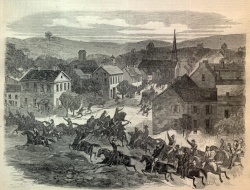Difference between revisions of "Portal:Inalienable Rights"
From Civicwiki
m |
m |
||
| Line 26: | Line 26: | ||
Here are some things you can do: | Here are some things you can do: | ||
*Write (or edit) a page about about [[Inalienable rights|inalienable rights]]. What are inalienable rights? What did the concept mean to American independence? | *Write (or edit) a page about about [[Inalienable rights|inalienable rights]]. What are inalienable rights? What did the concept mean to American independence? | ||
| − | *Thing *Thing 3 | + | *Thing 2 |
| + | *Thing 3 | ||
</div> | </div> | ||
</td> | </td> | ||
Revision as of 16:22, 25 January 2014
Our Common Law Heritage
|
The American Civil War (1861–1865) was a bitter sectional rebellion against the United States of America by the Confederate States of America, formed of eleven southern states' governments which moved to secede from the Union after the 1860 election of Abraham Lincoln as President of the United States. The Union's victory was eventually achieved by leveraging advantages in population, manufacturing and logistics and through a strategic naval blockade denying the South access to the world's markets. In many ways, the conflict's central issues – the enslavement of African-Americans, the role of constitutional federal government, and the rights of states – are still not completely resolved. Not surprisingly, the Confederate Army's surrender at Appomattox on April 9, 1865 did little to change many Americans' attitudes toward the potential powers of central government. The passage of the Thirteenth, Fourteenth and Fifteenth amendments to the Constitution in the years immediately following the war did not change the racial prejudice prevalent among Americans of the day; and the process of Reconstruction did not heal the deeply personal wounds inflicted by four brutal years of war and more than 970,000 casualties – 3 percent of the population, including approximately 560,000 deaths. As a result, controversies affected by the war's unresolved social, political, economic and racial tensions continue to shape contemporary American thought. The causes of the war, the reasons for the outcome, and even the name of the war itself are subjects of much discussion even today. |
 Morgan's Raiders entering Washington, Ohio in August, 1863 |
CategoriesClick on arrows to see subcategories and articles. Things you can doHere are some things you can do:
|
Sand Box
|